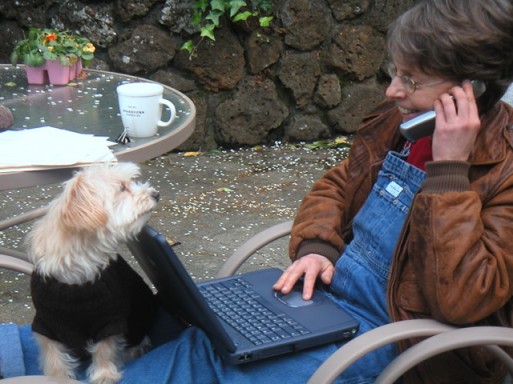Dedicated to helping people prepare for end of life, Sally Shannon is an uplifting life coach, organizer, and home funeral guide. She is a member of the San Francisco Home Funerals Alliance, with a focus on preplanning.

Sally with Duffie (deceased)
Aurora: What does it mean to you to “get your affairs in order”?
Sally: Most people think of it as legal and financial planning, but I leave that to attorneys and financial planners. I ask, what are the personal, practical, and spiritual plans that you want to address to feel complete about your life?
Everyone has an estate, even the homeless guy – his cart, tent, pillows, etc. We might be amazed at what that person owns if we did a little digging. And that stuff probably would mean a lot to another homeless person. Besides sorting out one’s estate and making advance directives, practical elements of end-of-life planning include organizing everything from your landlord’s contact information to your insurance policies and frequent flier miles.
On the psycho-social-spiritual level, there is everything from caring for remains to looking at legacy – what do you want to accomplish; what is your notion of a legacy? You may want to write your memoir or anecdotes about your life, maybe sharing things about yourself that no one knows but you, and you want someone to know. For instance, I went scuba diving under ice! I wanted that written down somewhere.
Last but not least, there are personal elements such as forgiveness work. There is a lot of research coming out about forgiveness and the effect it has on our mental and physical health. We want to put all our energy towards living life.
Aurora: Who needs to make an end-of-life plan?
Sally: Everybody. I promise you: if you do this work, your life will change. This work is both practical and deeply emotional. You will know yourself in new ways. Do this work and you will discover new values and/or deepen and recommit to those values you already hold dear…
Everybody should make a plan now — but especially baby boomers, adults with aging parents, all parents and especially single parents (do your children have a designated guardian?), procrastinators, and people who are medically fragile.
Aurora: Why should someone plan for death now, especially if they are young and healthy?
Sally: The whole notion of engaging in loss and practicing forgiveness frees up creative energy that allows us to stand into that moment in the future, instead of living in the past. No matter what your age, you’re going to be more available to your life and more forward moving.
I created a plan — everything from my medical history to stories from my life that could be used in a eulogy; preferences for caring for my remains; who I want to run the memorial service; documents so that people close to me will have access to my medical records, HIPAA releases, etc.
Let me tell you, it’s a huge relief to have every practical detail ironed out. I’m always able to get into my accounts. I know where all my money is. I know whom to call if I have any questions. My life is organized. I feel good because, being in the last third of my life, I’ve seen a lot of death and I’ve seen many families fight over the will, or preferences of the deceased regarding their remains or memorial service — but I know I’ve put everything in place, down to who’s going to take care of my dog and get my grandmother’s quilt. That way my loved ones can focus on grieving, because I’ve taken responsibility for myself.
Aurora: This is a lot to tackle. Where do you recommend SevenPonds readers begin?
Sally: Assuming you have a will and financial plan, the first thing you should do is partner with someone or create a circle of friends, a book group, even a collection of colleagues, who will commit to doing this together. One of the reasons to partner with others is that you establish accountability for your goals. You say to someone, ‘okay, by August 1st I’m going to have created my contact list.’ Research shows that this makes you much more likely to complete your goal.
Once that’s done, completing an advance directive and opening the conversation around healthcare is where you should start. Then make your contact list. I made a database in FileMaker Pro with different categories — such as “notify upon death,” “could help in an emergency” and “professional contacts.” It’s a spreadsheet with people’s names and phone numbers, with boxes (such as “family member” to check where appropriate). Next, make a list of all your accounts, passwords, security questions, etc. Keep it organized!
What’s most important to know is that 1) there are choices to make, 2) don’t let the medical and funeral industries go on automatic pilot, resulting in pain and suffering, expense, and violation of your values, and 3) communicate your choices. And there are no wrong choices. There are only choices that are right for each individual.
Aurora: Thank you so much, Sally! I’d better get started…
You can reach Sally at sallyshannon@earthlink.net.
Further reading:
On end of life planning:
http://www.huffingtonpost.com/judith-johnson/end-of-life-planning_b_825688.html
On LeaveLight End-of-Life Planning Circles:
On home funerals:
http://homefuneralalliance.org/
http://www.finalpassages.org/ (Local program in Sonoma County)
On green burial:
http://www.greenburialcouncil.org/

 What is End-of-Life Planning? An Interview with Sally Shannon
What is End-of-Life Planning? An Interview with Sally Shannon


 John Mulaney’s “Funeral Planning” on Netflix: No Real Plan
John Mulaney’s “Funeral Planning” on Netflix: No Real Plan

 Composting Bodies Is Now Legal in a Dozen States
Composting Bodies Is Now Legal in a Dozen States














